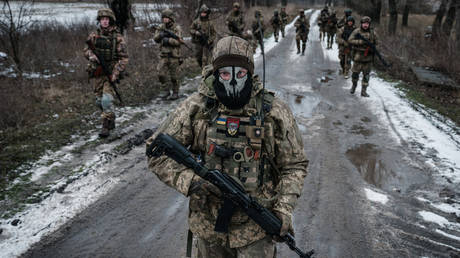ARTICLE AD BOX
The bloc’s top diplomat has admitted that not all member states see Russia as a “strategic threat”
Josep Borrell, the top diplomat of the European Union, has emphasized the potentially severe consequences for the EU if it fails to address the Russia-Ukraine conflict and resolve the ongoing Middle East crisis.
At a geopolitical summit organized by Le Grand Continent journal on Wednesday, Borrell highlighted the urgency of the Israel-Hamas conflict but deemed the Moscow-Kiev hostilities as “the most important existential threat that we are facing.”
Describing Russia as an “imperialist” and “colonial power, which is in search of its identity,” Borrell warned that the actions against Kiev pose a significant threat not only to Ukraine but also to Europe as a whole.
“If we do not change course rapidly, if we don’t mobilize all our capacities, if we let [Russian President Vladimir] Putin win the war in Ukraine; if we are not able to stop the tragedy… in Gaza, our project will be very much damaged,” he said.
Borrell emphasized that European policymakers should not focus on whether Russia will win the conflict but on taking action to prevent such an outcome.
Read more Backers pressing Ukraine for ‘frozen’ conflict – FT
Backers pressing Ukraine for ‘frozen’ conflict – FT
However, he acknowledged that some EU members do not perceive Russia as “a strategic threat” but refrained from speculating on potential divisions within the bloc over the Ukraine conflict.
Highlighting global disparities in views on the Moscow-Kiev hostilities, Borrell noted that while many countries condemn the invasion of a neighbor, their primary concern is ending the war swiftly due to the unbearable consequences.
“Yes, they say that it is very bad to invade your neighbor… But they stop there and demand that we end this war as soon as possible. Why? Because they can’t bear its consequences,” he explained.
Russia has consistently stated that it harbors no intentions of launching an attack on NATO, the US-led military coalition that encompasses numerous EU nations. Moscow asserts that it doesn’t hold any fundamental disputes with the alliance. Despite this, Russian officials have emphatically criticized Western military assistance to Kiev, cautioning that such support would extend the conflict and entangle the West directly in the hostilities.
While many EU countries have expressed support for Ukraine, some exceptions exist. Hungary has refused to supply arms to Kiev and recently blocked the EU’s €50 billion ($54 billion) assistance package for Ukraine. Similarly, under Prime Minister Robert Fico, Slovakia has halted weapons shipments to Ukraine, advocating that “the EU should change from an arms supplier to a peacemaker.”
.png)
 1 year ago
5
1 year ago
5








 English (US)
English (US)